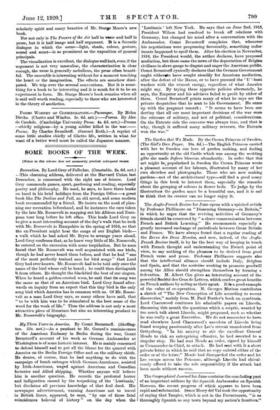The Anglo-French Review for June opens with a spiritedartiole by
Professor Phillimore on " Disarming Germany—in Britain," in which he urges that the reviving activities of Germany's friends should be countered by " a closer communication between French and British Learning." He recommends especially a greatly increased exchange of periodicals between Great Britain and France. We have always found that a regular reading of the Revue dee Deux Mantles, and now, indeed, of the Anglo- French Review itself, is by far the best way of keeping in touch with French thought and understanding the French point of view, to say nothing of the pleasure to be derived from good French -verse and prose. Professor Phillimore suggests also that the intellectual alliance should include Italy, Belgium and Spain, and that the societies working to promote goodwill among the Allies should strengthen themselves by forming a federation. M. Albert Cim gives an interesting account of the powerful Societe des Glens de Lettres, which confers great benefits on French authors by acting as their agent. It is a good example of the value of co-operation. M. Georges Matisse contributes a sketch of "The New Conception of Life according to recent discoveries," mainly from M. Paul Portier's book on symbiosis. Lord Charnwood continues his admirable papers on Lincoln, discussing this month the questions which a sceptic, wearied by too much talk about Lincoln, might propound, such as whether he was really a great Executive. We do not remember to have read elsewhere Lord Cbarnwood's anecdote of Lincoln being found weeping passionately after Lee's retreat unmolested from Gettysburg. " In his anxiety to stir the excellent General Meade to risk an enterprising offensive, he had resorted to a singular step. He had sent Meade an order, signed by himself as Commander-in-Chief, to attack. He had sent with it a short private letter in which he said that no copy existed either of the order or of the letter." Meade had disregarded the order and let Lee escape across the Potomac, although Lincoln had chival- rously offered to take the sole responsibility if the attack had been made without success.






































 Previous page
Previous page